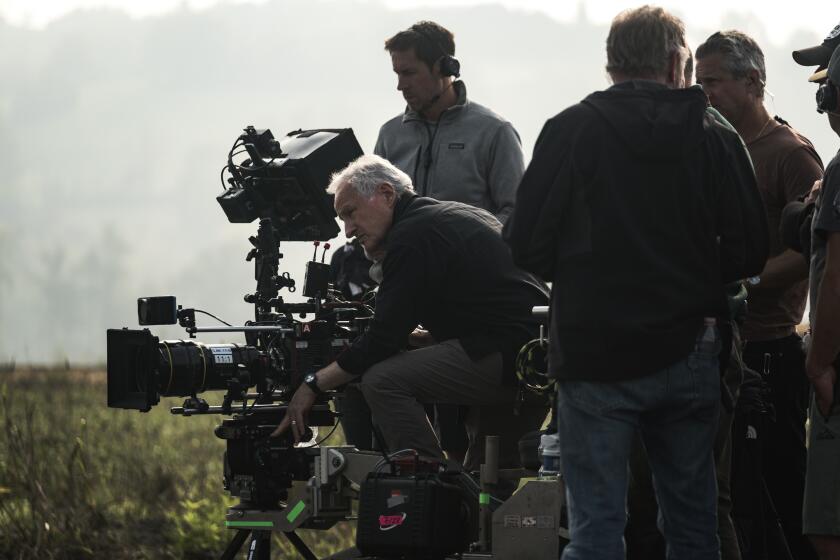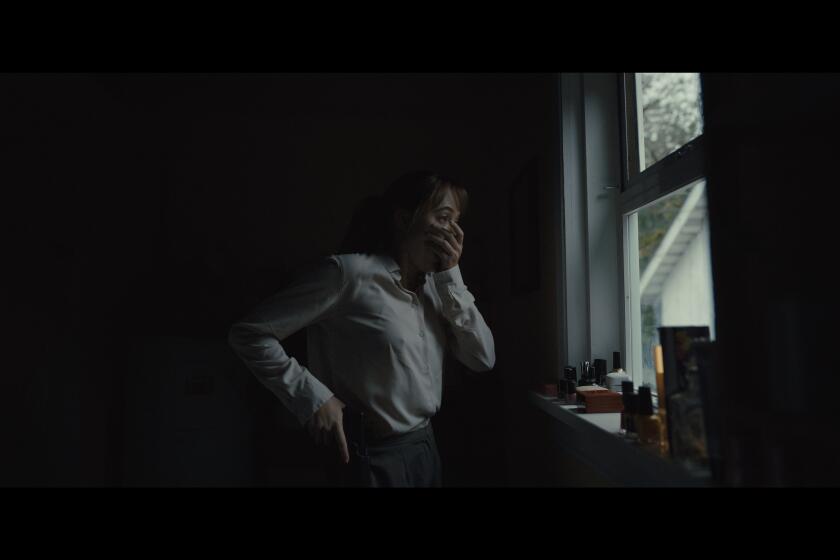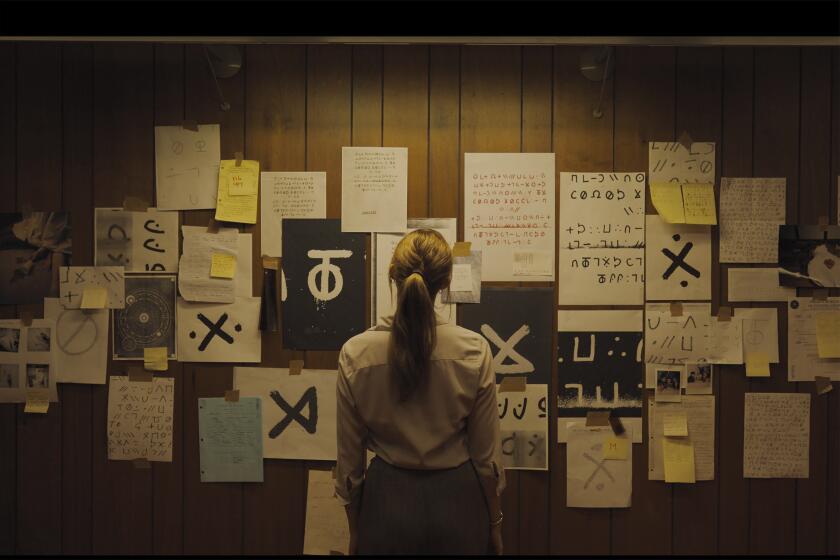Indie Focus: A getaway goes awry in ‘The Rental’
Hello! I’m Mark Olsen. Welcome to another edition of your regular field guide to a world of Only Good Movies.
Only good movies
Get the Indie Focus newsletter, Mark Olsen's weekly guide to the world of cinema.
You may occasionally receive promotional content from the Los Angeles Times.
Justin Chang wrote a powerful tribute this week to what we’ve been missing out on by not being able to go to the movies this summer. It’s not just big studio blockbusters. It’s those joyful discoveries of art house ephemera, obscurities and oddballs.
As Justin wrote, “The appreciation for a certain strain of art cinema — the kind that journalists like to describe using words such as ‘rarefied,’ ‘difficult’ or ‘impenetrable,’ depending on their persuasion — has never been a function of superior intelligence. As with any level of appreciation in any artistic medium, it’s primarily a matter of taste, exposure, patience, knowledge, adventurousness and appetite. It’s also a matter of, yes, trusting critics who might steer you toward something off the beaten multiplex path — something that doesn’t necessarily boast an emotionally accessible protagonist, a three-act structure or any of the other usual narrative footholds. Tastes can be acquired; appetites can too.
“The question now is whether those tastes and appetites can be nurtured, and satisfied, during a health crisis that has temporarily removed theaters and film festivals from the equation. It’s about the fate of cinema that exists as something other than a Netflix-branded narrative delivery machine, and that — in a time of ever more scattered and fragmentary home-viewing habits — requires the light of an enormous screen, the hush of a darkened auditorium and the investment of a fully attentive audience in order to cast its spell.”
And in the ongoing saga of when movie theaters might reopen, this week Ryan Faughnder took a look at how AMC Theatres pushed back their potential reopening date once again as Warner Brothers delayed the release of Christopher Nolan’s “Tenet” and Disney pushed back “Mulan.” Many other films’ release dates were postponed as well, from Wes Anderson’s “The French Dispatch” to James Cameron’s “Avatar” sequels.
However, New York City’s Metrograph, which has quickly become among the country’s most innovative and influential theaters, has announced a new Metrograph Digital program that launches today. Billed as “a celebration of communal movie watching,” the Metrograph program will include set showtimes, introductions and Q&As. The initial selections will include films by Claire Denis, Djibril Diop Mambéty, Nan Goldin, Eric Rohmer, Satoshi Kon and many others, with guest introductions from Noah Baumbach, James Gray, Jenna Bliss, Yasmina Price and more. Monthly memberships begin at only $5. (I for one have already signed up.)
Enjoying this newsletter? Consider subscribing to the Los Angeles Times
Your support helps us deliver the news that matters most. Become a subscriber.
‘The Rental’
The first feature directed by Dave Franco, who co-wrote the screenplay with filmmaker Joe Swanberg, “The Rental” follows two couples as they go for a weekend away at a remote rental house that takes a dark turn. Starring Dan Stevens, Alison Brie, Jeremy Allen White, Sheila Vand and Toby Huss, the film is in select drive-ins and on VOD.
I reviewed for The Times, writing, “The film — an ambitious hybrid of relationship drama and horror thriller under an umbrella of contemporary technology fears — doesn’t quite fulfill its premise on any front in telling the story of a getaway vacation that gets very out of control.”
Sonaiya Kelley untangled the movie’s ominous ending in a story that will be publishing soon.
For the New York Times, Jeannette Catsoulis wrote, “Whether ‘The Rental’ will injure the Airbnb industry is debatable, but its impact on moviegoers will otherwise barely be noticed. Featuring one of the most dissatisfying, anticlimactic endings in genre memory, this paranoid thriller (the directing debut of Dave Franco) turns an isolated seaside villa into a slaughterhouse.”
For Slate, Sam Adams called the film “a noteworthy entry in the burgeoning minigenre of Airbnb horror movies, largely for how little spin it puts on the concept … In an ordinary year, its release date would sync up with vacation season, but with travel options limited to the domestic and the length of a car ride (preferably without pee breaks), the way it exploits the unease of slipping into the home of a person you’ve never met feels especially acute.”
‘Radioactive’
Directed by Marjane Satrapi, “Radioactive” stars Rosamund Pike as famed scientific pioneer Marie Curie, the first woman to win the Nobel Prize and still the only woman to have won twice. Sam Riley also stars as her husband and partner Pierre, and Anya Taylor-Joy plays their daughter Irène, who would also win a Nobel Prize. The film is available on Amazon Prime Video.
I spoke to Satrapi and Pike for a story that will be publishing soon. Besides how it valorizes science, the movie is unexpectedly timely for its depiction of a woman unafraid to speak her mind and refuse to compromise in her work. Just don’t call her difficult. As Satrapi said, “It’s very bizarre that we will call her difficult. But if she was a man we would say he is a genius, so of course, as a genius, he’s difficult because he’s concentrated. We accept very easily the fact that a man would be a genius and would be a difficult person. ... I think that all women, they have to misbehave a little bit. By behaving good we never achieve anything.”
Reviewing the film for The Times, Katie Walsh wrote, “The [Curies’] complicated legacy marks Satrapi’s film, which wrestles mightily with what Curie left us: radiation treatment for cancer and X-ray machines, but also Hiroshima and Chernobyl … These flourishes, as well as some striking compositions shot by Anthony Dod Mantle, Danny Boyle’s regular cinematographer, breathe life into this otherwise staid telling of Curie’s life. Pike is predictably fantastic as the determined, almost obsessive to the point of self-destruction Curie. But despite the talent involved, and the incredible subject matter, the irritating tendency to overexplain means there’s very little spark to be found in the enervating ‘Radioactive.’”
For the New York Times, Manohla Dargis wrote, “‘Radioactive’ is more provocative and satisfying than the average waxworks, but Satrapi’s visual strategies also point to the even more fully adventurous movie that could have been. Even so, it pulls you in and sometimes knocks you sideways, most notably with the scenes illustrating the terrors that Curie’s discoveries led to, a reminder that this isn’t just about one life but many. Bluntly effective and dialectical, these interludes reinforce one of the movie’s refrains: Science is invariably political and, in the right hands, can be a force for good and, in the wrong, a weapon of evil.”
For Variety, Amy Nicholson wrote, “Curie wasn’t always logical. Later in life, she had an affair with Pierre’s married doctoral student Paul Langevin (Aneurin Barnard), which triggers mushroom cloud-sized scandal with French moralists (or perhaps just xenophobes) picketing to send her back to Poland. Yet as startling as it is to see the beloved scientist hated in her time, that we’re able to see this headstrong legend as a sexual being at all is a credit to how much Pike gradually humanizes her as a woman, while never pleading for our pity. (Something the real Curie would have loathed.) The globe has applauded Curie’s creation long after her death, polishing the marble image ‘Radioactive’ works hard to scuff. Instead, says Satrapi, admire her passions — even when they were also the core of her doom.”
‘Yes, God, Yes’
Written and directed by Karen Maine, “Yes, God, Yes” stars Natalia Dyer as a Midwestern Catholic school teenager who discovers the forbidden pleasures of masturbation, opening up new worlds of sexuality, rebellion and identity. Maine was co-writer of the abortion-themed “Obvious Child” and so deftly handles the movie’s mixture of controversy and comedy. The movie is in virtual cinemas now and on digital and VOD starting Tuesday.
Reviewing for The Times, Katie Walsh wrote, “Anyone who has experienced the fumblings of budding adolescent desire straining against the rigidity of a religious education will be transported back to those heady days (whether you like it or not), thanks to Maine’s incredible recall for detailed specificity and star Natalia Dyer’s expressive performance … Maine’s approach to the material is not to gloss over it with wit or sparkle but to deeply lean into the cringe-core aspect of Alice’s experience.”
For rogerebert.com, Sheila O’Malley wrote, “It’s baffling that ‘Yes, God, Yes’ was saddled with an R rating. There’s no nudity, no tough language, nothing exploitative or racy. This is a sweet sincere film about a girl getting all twisted up because of the mixed messages passed down to her. There’s nothing here that would shock a teenager. On the contrary: There is much here that would say to a teenage girl: ‘You probably think you’re all alone in feeling like this. Good news: you’re not.’”
For the Hollywood Reporter, Beandrea July wrote, “Recovering Catholics will likely find this movie therapeutic … Sometimes it feels like the film wants to go even harder at Catholicism than it does, but it holds back as if aware that it will offend. Maine’s righteous — though perhaps unresolved — anger toward the Catholic Church sometimes distracts viewers from the larger story being told. It’s the kind of pic conservatives would hold up as a perfect example of godless liberals mocking the faith of people with sincere religious beliefs.”
Only good movies
Get the Indie Focus newsletter, Mark Olsen's weekly guide to the world of cinema.
You may occasionally receive promotional content from the Los Angeles Times.




